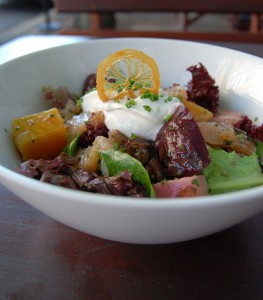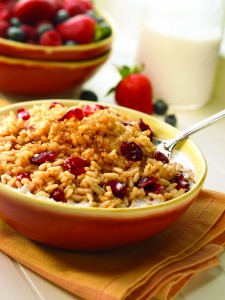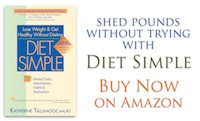This Looks Healthy, But Is It?
- At December 27, 2010
- By Katherine
- In Articles, News
 0
0
A restaurant meal may look like it’s good for you, but we had a lab count the actual calories. Here are the surprising numbers.
By Todd Kliman , Sara Levine , Ann Limpert
We set out to find out. We dispatched staff to pick up three-course meals from five restaurants, each with a different cuisine. Then we packed the food up in containers filled with dry ice and shipped it to a lab in Des Moines, Iowa, for burning—yes, burning—to measure its caloric content. We also had it tested for proteins, fats, and carbohydrates.
The results: Who knew that a three-course sushi dinner has more carbs than a three-course French dinner? Going out for Thai sounds like an excursion into light, bright cooking, but a meal at a Thai restaurant can be nearly as caloric as a certain New Orleans – Style restaurant. Note to all the lobbyists who chow down on the latter’s shrimp and grits and beignets several times a week: In one dinner you may be taking in more than a day’s worth of calories.
Lab results in hand, we invited two experts to help us make sense of the numbers. Walter Scheib, who as White House chef under Bill Clinton and George W. Bush was tasked with finding out the nutritional content for every meal he served to the First Family—and who went on diets with First Ladies—commented on each dish. Katherine Tallmadge, a DC nutritionist who has been a guest expert on TV shows from Food Network programs to Good Morning America, offered commentary and alternative recommendations for each meal.
Our hope is not that you’ll come away from this vowing to steer clear of these restaurants. Rather, we hope you’ll come away a wiser, healthier diner.
Menu
Vegetable Spring Rolls With Sweet-and-Sour Sauce
Roasted Duck With Red Curry Sauce, Side of White Rice
Thai Coconut Custard With Sweet Rice
Calories: 2,226
Carbs: 307 grams
Fat: 82 grams
Protein: 65 grams
Walter Scheib says: “[Spring rolls] are little grease sponges. But there are wonderful things called summer rolls, which are basically spring rolls that are fresher and lighter—and without the deep-fried part.”
“Thai desserts are based on rice and coconut. Go for sorbets or fruit ices—just not coconut ice cream, which is basically frozen butter. Ask if they’ve got a fresh mango with a squeeze of lime.”
“Most people think of Oriental cuisines as ‘light.’ When I worked at the White House, this is what Mrs. Clinton used to call gratuitous fat—fat in your food that you don’t necessarily see. You’ve got coconut milk, which is straight fat, and then the duck skin.”
What to get instead: Coconut milk is the biggest source of calories and fat on this diet-busting menu. Often you don’t even know it’s there. Instead look for dishes that get their flavor from citrus juices, spices, vinegars, and herbs.
Katherine Tallmadge, a Thai Restaurant regular, orders lemongrass soup, beef salad, and steamed whole fish: “If your main dish is a lot of food, you probably don’t want the extra rice. A cup is 200 calories.” If you’re going to have noodles, get cellophane noodles, made with mung beans instead of flour. And keep in mind that at many Asian restaurants, portions are served family-style and meant for sharing.
Photo: Washingtonian Magazine
New Study Finds Certain Foods Lead to Living Longer
- At December 22, 2010
- By Katherine
- In Articles, News
 0
0
 Eating Healthier Means Living Longer
Eating Healthier Means Living Longer
According to New Study in the Journal of the American Dietetic Association
Researchers found that diets favoring certain foods were associated with reduced mortality.
The leading causes of death have shifted from infectious diseases to chronic diseases such as cardiovascular disease and cancer. These illnesses may be affected by diet. In a study published in the January 2011 issue of the Journal of the American Dietetic Association, researchers found that diets favoring certain foods were associated with reduced mortality. Scientists investigated empirical data regarding the associations of dietary patterns with mortality through analysis of the eating patterns of over 2500 adults between the ages of 70 and 79 over a ten-year period.
By 2030, an estimated 973 million adults will be aged 65 or older worldwide. The objective of this study was to determine the dietary patterns of a large and diverse group of older adults, and to explore associations of these dietary patterns with survival over a 10-year period. A secondary goal was to evaluate participants’ quality of life and nutritional status according to their dietary patterns.
By determining the consumption frequency of 108 different food items, researchers were able to group the participants into six different clusters according to predominant food choices:
- “Healthy foods” (374 participants)
- “High-fat dairy products” (332)
- “Meat, fried foods, and alcohol” (693)
- “Breakfast cereal” (386)
- “Refined grains” (458)
- “Sweets and desserts” (339).
The “Healthy foods” cluster was characterized by relatively higher intake of low-fat dairy products, fruit, whole grains, poultry, fish, and vegetables, and lower consumption of meat, fried foods, sweets, high-calorie drinks, and added fat. The “High fat dairy products” cluster had higher intake of foods such as ice cream, cheese, and 2% and whole milk and yogurt, and lower intake of poultry, low-fat dairy products, rice, and pasta.
The study was unique in that it evaluated participants’ quality of life and nutritional status, through detailed biochemical measures, according to their dietary patterns. After controlling for gender, age, race, clinical site, education, physical activity, smoking, and total calorie intake, the “High-fat dairy products” cluster had a 40% higher risk of mortality than the “Healthy foods” cluster. The “Sweets and desserts” cluster had a 37% higher risk. No significant differences in risk of mortality were seen between the “Healthy foods” cluster and the “Breakfast cereal” or “Refined grains” clusters.
Photo by Polly Wiedmaier
# 1 THE SUNDAE SOLUTION
- At December 19, 2010
- By Katherine
- In Articles, News
 0
0
NOW it’s official: You can eat a chocolate sundae every day and still lose weight…
One of my clients, Jennie, almost always snacks in the afternoon. She view these snacks as ‘rewards” for getting through another day of drudgery. Of course, these same snacks contribute to her weight problem.
My advice to her (and I’m pretty proud of it ): Have a chocolate sundae every day.
I know this sounds strange, but here’s why it helps. The chocolate syrup that you pour over ice cream isn’t exactly lean, but that’s okay because underneath the chocolate – the sundae part – is fresh fruit instead of ice cream. Fruit is a lot better for you than ice cream, and the chocolate provides a slightly sinful incentive to make the switch seem worthwhile.
Almost any fruit works with chocolate syrup – strawberries, bananas, peaches, take your pick. Apart from the fact that a fruit sundae is deliciously fresh tasting, filling, satisfying, and low in saturated fat and calories, it makes a great substitute for other snacks that really load on the calories.
THE SUNDAE SOLUTION has been responsible for hundreds of people eating – and LOVING – more fruit. If you try it, you will too!
BOTTOM LINE: Lose 9 to 35 pounds
A tablespoon of regular chocolate syrup has about 50 calories. Pour it over fruit, and your total is about 110 to 160 calories. Compare that to the usual snacks – a candy bar or protein bar, for example, has about 250 calories, and an ice cream cone has about 500 – and you can see why substituting the fruit sundae can lead to impressive amounts of weight loss. Make the switch every day, and you can count on losing 9 to 35 pounds in a year.
Get more wonderful tips like this that will make your diet simple!
Click here to buy “Diet Simple,” the book
Surprising New Vitamin D Recommendations
- At December 14, 2010
- By Katherine
- In News
 0
0
The American Dietetic Association supports a report issued Tuesday, November 30, by the Institute of Medicine calling for new dietary intake levels for calcium and vitamin D to maintain health and avoid risks associated with excess consumption. The new Dietary Reference Intake values are based on evidence supporting the roles of these nutrients in bone health but not in other health conditions.
“The American Dietetic Association appreciates the thorough research directed by IOM regarding adequate intake amounts and health benefits of calcium and vitamin D,” said registered dietitian and ADA Spokesperson Katherine Tallmadge. “This report provides the evidence-based information that Americans need to make informed decisions regarding their daily diet.”
The IOM report, Dietary Reference Intakes for Calcium and Vitamin D, offers specific recommendations on the amounts of calcium and vitamin D that Americans should consume each day. The report concludes there is not yet sufficient information about the health benefits of consuming these nutrients beyond bone health.
“Over the past several years there has been a great deal of interest and theory regarding the additional health benefits of calcium and vitamin D, including its effect on cancer, hypertension and cardiovascular disease, diabetes and immune response,” Tallmadge said.
“According to IOM’s thorough review, this information was from studies that could not be considered consistent or conclusive. The American Dietetic Association strongly believes in the use of evidence-based practice guidelines, especially when it comes to determining Dietary Reference Intake values for nutrients,” Tallmadge said.
Evidence-based practice means relying on the best available science as the basis for practice decisions. ADA has made a strong commitment to evidence-based practice and emphasizing the need for all practitioners to understand evidence analysis and use evidence-based guidelines in its work with patients and clients.
The IOM report also states that, while national surveys indicate the majority of Americans and Canadians are consuming enough calcium and vitamin D, “higher levels have not been shown to confer greater benefits, and in fact, they have been linked to other health problems, challenging the concept that ‘more is better’.”
The American Dietetic Association is the world’s largest organization of food and nutrition professionals. ADA is committed to improving the nation’s health and advancing the profession of dietetics through research, education and advocacy.
Lead Us Not Into Temptation
- At December 10, 2010
- By Katherine
- In News
 0
0
Original Content, The Washington Post
Don’t count on willpower! Instead, make things easy on yourself and your family by controlling your environment. To increase the likelihood of eating healthfully, make your food tasty, accessible and convenient:
• Clean, chop and store fruits and vegetables in plastic containers next to healthful dips. For the kids, keep them at eye level in the fridge so they’re easy to grab. (Or, if you’re pressed for time, buy fruits and vegetables already cleaned and chopped at the salad bar.)
• Make several-serving batches of delicious entrees, soups and salads, store them in plastic serving-sized containers in your fridge or freezer to prevent that stop for fast food on the way home.
• Weigh and measure foods before cooking or portioning at the dinner table. You can’t overeat it if you haven’t cooked it. Avoid serving “family style.”
• Eat, then shop! Don’t go grocery shopping hungry and always go with a list to prevent impulse purchasing.
• Minesweep for calorie bombs! If you can’t have just one cookie or one chip, keep them out of the house to avoid temptations.
• Quality, not quantity. Splurge on smaller amounts of your favorite expensive healthy delicacies such as raspberries, hearts of palm, wild salmon or crab meat instead of buying supersized but lower quality foods; those extra calories get stored as excess body fat.
• Buy the gadgets you’ll need: nonstick pans, a heavy-duty stock pot, food scale, measuring cups and spoons, plastic baggies of all sizes and plastic containers that go from freezer to microwave.
• Each healthful and delicious meal deserves your entire attention: Overeating is inevitable if you’re distracted by reading, working or watching TV. Sit at your dining or kitchen table without distractions and make eye contact and conversation with your family members while you eat. — Katherine Tallmadge
© 2004 The Washington Post Company
Accept No Substitutes: Dangerous Supplements?
- At December 10, 2010
- By Katherine
- In Articles, News
 0
0
 Original Content, The Washington Post
Original Content, The Washington Post
Taking multivitamins, Vitamin B-6, Folic Acid, Magnesium, Zinc, Copper, and particularly Iron, may increase death rates, according to a recent study published in the Annals of Internal Medicine. Only Calcium and Vitamin D were correlated with positive benefits.
Let me explain…
Many of us want to include nutrients, the right vitamins and minerals in our diet. But we often don’t want to eat all the foods and calories required to get this balance. What we’re looking for is a magic supplement that will give us more energy, improve the quality and length of life and prevent the chronic diseases of today such as heart disease, cancer and diabetes.
While we know that certain foods have been shown to provide these benefits, can the right supplement do the same?
Leading researchers are increasingly convinced that while supplements can serve many positive purposes, they cannot take the place of a well-balanced diet, and may even be dangerous.
The Importance of Food
“The thousands of vitamins, minerals and phytochemicals [beneficial plant compounds] in whole foods act synergistically together to create a more powerful effect than the sum of their parts, producing a result which cannot be recreated by supplements,” says Jeff Prince, vice president for education at the American Institute for Cancer Research.
Over the past century, nutrition experts gained a fuller appreciation of the need for a plant-based diet. Research began to show in the 1970s that certain patterns of eating, beyond vitamin and mineral intake, were influencing illnesses.
By the 1980s, they found that populations that ate more fruits, vegetables and high-fiber foods experienced lower rates of cancer, heart disease and diabetes. Also, by that time, discoveries had been made that newly discovered phytochemicals and certain vitamins and minerals acted as antioxidants and might prevent chronic diseases such as cancer and heart disease. After all, it had been found that people with high blood levels of two antioxidant vitamins (a form of vitamin A called beta carotene and vitamin E) had reduced lung cancer rates. It had also been observed that people who ate more dark-green leafy vegetables (high in beta carotene) experienced less lung cancer, even if they smoked.
Sensing a major breakthrough, the National Institutes of Health funded one of the biggest studies ever conducted. Known as the ATBC (Alpha-Tocopherol, Beta Carotene) Cancer Prevention Study, published in the New England Journal of Medicine in 1994, it tested the theory that the antioxidant vitamins beta carotene and alpha-tocopherol (vitamin E) would prevent lung cancer in smokers, the highest-risk population. After following 29,000 male smokers for six years, the stunned researchers found “a higher incidence of lung cancer among the men who received beta carotene supplements than among those who did not. In fact, this trial raises the possibility that these supplements may actually have harmful as well as beneficial effects.”
Needless to say, these revelations sent shock waves through the scientific community. “This study was a turning point in the nutrition field, especially when multiple studies kept confirming that supplements didn’t work at preventing cancers and heart disease,” says David Klurfeld, national program leader for human nutrition at the USDA’s Agricultural Research Service. “People think that we can pull out the fiber, pull out the antioxidants. But research does not back that up. Study after study says you gain the most benefit from whole foods.”
That is not to say that supplements are of no use. They can be of great benefit, when taken based on individualized needs. This study, and others like it, stress the importance of personalizing your supplement needs by reviewing your medical, family and personal history, your food intake, THEN and only THEN, decide what you might be lacking and make an educated decision, preferably with the help of a registered dietitian and your doctor. Supplements simply can’t compete with better food choices. Consider these findings:
• When the ATBC Cancer Prevention study data was re-analyzed years later for consumption of fruits and vegetables, researchers found that while supplements did not prevent lung cancer, eating fruits and vegetables high in beta carotene (e.g., carrots, sweet potatoes), lycopene (e.g., tomatoes) and lutein/zeaxanthin (deep-green leafy vegetables such as spinach and kale) reduced lung cancer risk.
• A diet high in cereal and vegetable fiber (35 grams versus 15 grams) reduces the risk of colon cancer by 40 percent, according to recent findings in the EPIC (European Prospective Investigation into Cancer and Nutrition) study. But studies of fiber supplements have failed to find any benefits and some have found an adverse effect.
• A diet high in fruit reduces lung cancer risk by 40 percent, also according to new EPIC study findings. Another study found subjects with a high fruit intake had a 44 percent lower risk of lung cancer compared with subjects eating the least amount of fruit. But when subjects added beta-carotene supplements, there was no benefit from the fruit.
• Men who ate 10 servings of tomato products weekly reduced their risk of prostate cancer by 35 percent compared with men who ate fewer than 1.5 servings, according to a Harvard Health Professional study. While the benefit is largely attributed to the phytochemical lycopene, trials of lycopene so far have found it is less potent than the tomato.
• A diet high in fruits and vegetables reduced stroke risk by 28 percent, and fruit alone reduced the risk by 40 percent, according to a study published in the American Journal of Clinical Nutrition in 2003. No dietary supplements have been found that significantly reduce stroke risk.
• People who ate collard greens or spinach two to four times per week had a 46 percent decrease in risk for age-related macular degeneration (the leading cause of blindness) compared with those who ate these vegetables less than once per month, according to a study published in the Journal of the American Medical Association this year. No studies have found supplements prevent or improve macular degeneration.
• People who eat more soy have a decreased risk for coronary heart disease, breast cancer and prostate cancer. But when various components of soy foods have been isolated and studied, these finding have not been replicated, and some have found adverse effects.
• A diet high in antioxidant-rich foods helps prevent cardiovascular disease, but the studies of individual antioxidant supplements have been so inconclusive that the American Heart Association recently issued an advisory against taking them to reduce cardiovascular disease
“Researchers are working as fast as we can to find the most effective components in foods,” says Janet Novotny, research physiologist at USDA’s Human Nutrition Research Center in Beltsville. “But so far, studies have shown that while fruits and vegetables are associated with decreased risk of chronic disease, studies of the isolated compounds in fruits and vegetables haven’t shown an effect.”
Food and dietary patterns are complicated and expensive to study, and can defy the brightest minds and best intentions. In the meantime, the best advice is to eat a plant-based diet with at least five to nine servings of fruits and vegetables (you’ll get the most benefit with the higher amount), at least three to four servings of whole grains and regularly eat legumes as a side dish or occasionally as your protein source.
Successful Weight Loss Depends on Frequency of Interaction with a Dietitian
- At December 10, 2010
- By Katherine
- In News
 0
0
Physicians frequently prescribe medications to help individual’s lose weight. More often than not, few other lifestyle modification changes are recommended, or resources provided. Researchers sought to compare methods of delivering lifestyle modification programs to patients receiving sibutramine, a prescribed weight loss medication.
This study once again shows that the more frequently a person interacts with a dietitian to help in their weight loss endeavors, the greater the weight loss – even if weight loss medication is involved. The HF-TEL contact with a dietitian was similar to HF-F2F in promoting weight loss. Even the email counseling resulted in a weight loss that, sustained over time can have a considerable impact on a person’s risk of developing disease. In real-world situations, it may be difficult to conduct face-to-face sessions with a provider over the long haul, but when other methods are used together, they can work synergistically to help a person achieve their desired weight loss.
Resource: Digenio AG, Mancuso JP, et al. Comparison of methods for delivering a lifestyle modification program for obese patients: a randomized trial.Ann Intern Med. 2009;150(4):255-62
Immune-System Boosting Nutrition
- At December 07, 2010
- By Katherine
- In Articles, News
 0
0
Check out CNN’s article and video featuring Katherine’s immune-boosting tips:
What you eat profoundly affects your ability to fight disease. With all the nasty bugs going around this cold and flu season, it’s especially important to pay attention to boosting your immune system through nutrition. While every nutrient is important in your body’s ability to prevent and fight disease – from colds to cancer – certain nutrients play key roles:
Protein
Protein is one of the most important nutrients in the human body, second only to water. Bone health, muscle function, muscle strength, muscle mass and immune function — all are impaired with a low protein intake. In fact, the antibodies which are essential to protecting your body against pathogens, are made of protein, so without enough protein, your body has no chance. Certain vulnerable populations, such as the elderly, children, and those who already have compromised immune systems, should be particularly careful to eat enough protein – in fact, even more than the recommended dietary allowance – for maximized protection.
Protein can be found in a wide range of foods. Animal protein is in seafood, dairy, meat, poultry and eggs. Vegetarian protein can be found in legumes, soy, vegetables and grains. And while it’s true that high-protein foods often bring fat and calories along as uninvited guests, it doesn’t have to be that way. The lowest-calorie animal protein sources are the leanest. Go for eggs, seafood, poultry with no skin, skim milk, nonfat or lowfat yogurt, and lowfat cheeses are also great options. Soy products also provide great low-calorie options and are high quality proteins similar to animal protein.
Protein foods have other benefits. Fish, legumes, seeds, nuts contain immune-boosters zinc and iron (but in too high quantities, for instance in megadose vitamin pills, can backfire and suppress the immune system). Dairy products (keep them fat-free or low fat) are naturally loaded with magnesium, potassium and calcium – all important for immune function. Beans and soy beans are high in iron, zinc and magnesium.
Fats and Oils
The type of fat you eat can improve the effectiveness of your body’s immune response because fat ends up in all of your body’s cell walls. It acts as a cell lubricant, improves flexibility and communication between cells, and is important for cell metabolism and gene expression. If the fat you eat is saturated – solid at room temperature – as in butter or animal fat – this decreases cellular flexibility and functioning. So, to maximize your immune response, use oils in your cooking, such as olive and canola oil and stick with foods high in heart-healthy fats, such as nuts, avocados and fatty fish, which is high in omega-3-fatty acids. Minimize animal fats in dairy products, red meats, butter, cream and desserts.
Vitamins and Minerals
Studies show all nutrients are involved in your immune response but taking high doses of certain nutrients can cause imbalances, backfire, and actually suppress your immune response. So it’s ideal to get your vitamins and minerals from a nutrient-rich, balanced diet. Though you may benefit from taking a basic multi-vitamin and mineral supplement to cover your bases. And there may be some exceptions depending on your own nutritional status (best to get personalized advice from your dietitian and doctor)…
Vitamin D
New research has found Vitamin D augments the body’s ability to eliminate disease-infecting microbes, and most of us are deficient in Vitamin D, which we get from the sun and very few foods. Your doctor should check your vitamin D status at your next visit to make sure your blood values are adequate to fight infection, among other things. That said, most of us need a vitamin supplement with vitamin D, usually somewhere between 1,000 and 4,000 IU/day. But check your blood values first. They should be somewhere between 50 and 75 for most people. Click my “Vitamin D” article above…
For Those Over 50
Vitamin E
Studies from Tufts University found that vitamin E supplementation may help fight the common cold and other upper respiratory tract infections. The recommendation is about 400 IU/day
Zinc
Zinc helps fuel the production of infection-fighting white blood cells so a lack of zinc reduces immune response and illness recovery time is prolonged. The elderly are particularly vulnerable to deficiencies and may even need more than normal. So here’s another case where a supplement may be useful. When zinc supplements were given in a nursing home, residents reduced their risk of contracting pneumonia, according to researchers from the Jean Mayer USDA Human Nutrition Research Center on Aging at Tufts University.
Vitamin B 12
Vitamin B 12, another nutrient important for immune function, is poorly absorbed in many elderly patients (and is missing from the diet of vegans) which is why your vitamin B 12 status should be checked by your doctor and you may need a supplement – in the form of an injection. For most of us, though, B 12 is easily obtained and absorbed by eating any animal products.
Probiotics
Ground-breaking research in the past decade shows the good bacteria in the gut, which aids immune response, reduces insulin resistance – a precursor to diabetes, reduces body fat, maintains muscle, improves absorption of important nutrients, and lowers as we age, making us susceptible to many diseases from cold to cancer. There is evidence that eating more of the good bacteria, such as lactobacillus in yogurt and kefir, may help your immune response. Check out my article about probiotics for more info.
The following is a list of foods containing key immune-boosting nutrients.
Include them in your diet every day:
High Beta Carotene Foods
Orange and deep green veggies and fruits, particularly…Carrot juice, carrots, butternut squash, pumpkin (or any orange-colored winter squash), sweet potato, greens such as spinach, collards, kale, turnip greens, beet greens, orange melons such as cantaloupe, red peppers, apricots, broccoli, plums, mangos papayas, plantains, Brussels sprouts, watermelon, asparagus
High Vitamin C Foods
Citrus fruits such as orange, lemons and grapefruit, peaches, sweet and hot peppers, papayas, pineapple, strawberries, broccoli,kiwi fruit, sweet potatoes, Brussels sprouts, kohlrabi,
High Zinc Foods
Oysters, lobster, crab, clams, fortified whole grain cereals, beans (legumes such as lentils, chick peas, black-eyed peas, soy beans, kidney beans, limas, pintos), turkey, whole grains such as buckwheat, whole wheat, cracked wheat (bulgur), oats, whole grain cornmeal, wild rice, yogurt, pine nuts, sunflower seeds, mixed nuts, peanuts
High Magnesium Foods
Whole grains such as buckwheat, wheat, oats, cornmeal, barley, brown rice, Also soybeans, pumpkin seeds, brazil nuts, cashews, greens such as spinach, beet greens, fish such as halibut, haddock and flounder and sole species, beans (legumes such as black beans, white beans, soy beans, navy beans, limas, black-eyed, great northern, kidney, chick peas,. lentils)
High Vitamin E Foods
Sunflower seeds, almonds, sunflower oil, safflower oil, canola oil, hazelnuts, pine nuts, spinach, turnip greens, beet greens, dandelion greens, canned pumpkin, carrot juice, broccoli, sweet potato, sweet red peppers, mangos, papayas
Cranberries
Have antibacterial qualities. Eat them dried for the highest levels of nutritious compounds
Have a myriad of beneficial health effects. They’ve been shown to boost the immune system, especially in relation to cancer. Called a “drug-botanical interaction,” mushrooms appear to increase the effects of chemotherapy, and lengthen survival.
Mushrooms also reduce fatigue.They act on the muscular system, body antioxidant system, cardiovascular system, hormone system, and immune system, all of which improve liver function, blood circulation, and blood glucose regulation, among other benefits.
Immune-Boosting Eating Strategies
* Eat a lean protein source at every meal – including breakfast, lunch and dinner. 20 grams for women and 30 grams for men is the amount most bio-available per sitting.
* Eat 5 cups of fruits and veggies per day – especially colorful varieties, eat at every meal and snack
* Eat a vegetarian meal every day using beans or soy beans for protein,
* Eat fish high in omega-3-fatty acids, such as salmon, herring, anchovies and sardines, at least two to four times per week, and vegetarian sources such as walnuts, ground flax seeds and canola oil,
* Use canola oil in your cooking and a fresh, newly harvested olive oil for drizzling,
* Eat whole grains at breakfast (such as cereal with skim milk or soy milk) and with sandwiches or wraps at lunch,
* Snacks: Try fat-free yogurt and fruit, fat-free yogurt dip or hummus with veggies,
* Toss nuts/seeds/dried cranberries in your whole grain cereal, your salad or your afternoon yogurt snack
* Skim milk or Soy lattes or teas are great snacks, too…
* Take a multivitamin-mineral supplement daily.
* Take a Vitamin D Supplement so that you are getting 1,000 to 2,000 IU/day
* If you are over 50, but particularly 65, look into supplementing your diet with Vitamin E, Vitamin B12, Zinc and probiotics such as lactobacillus in yogurt.
Of course, don’t forget to keep your blood moving by being moderately physically active with plenty of walking, yoga, etc. Get plenty of rest, wash your hands frequently, drink fluids (especially warm fluids which will send light steam into your nasal passages) and spend time with friends and loved ones. Studies have shown these habits increase your ability to conquer diseases – from colds to cancer.













